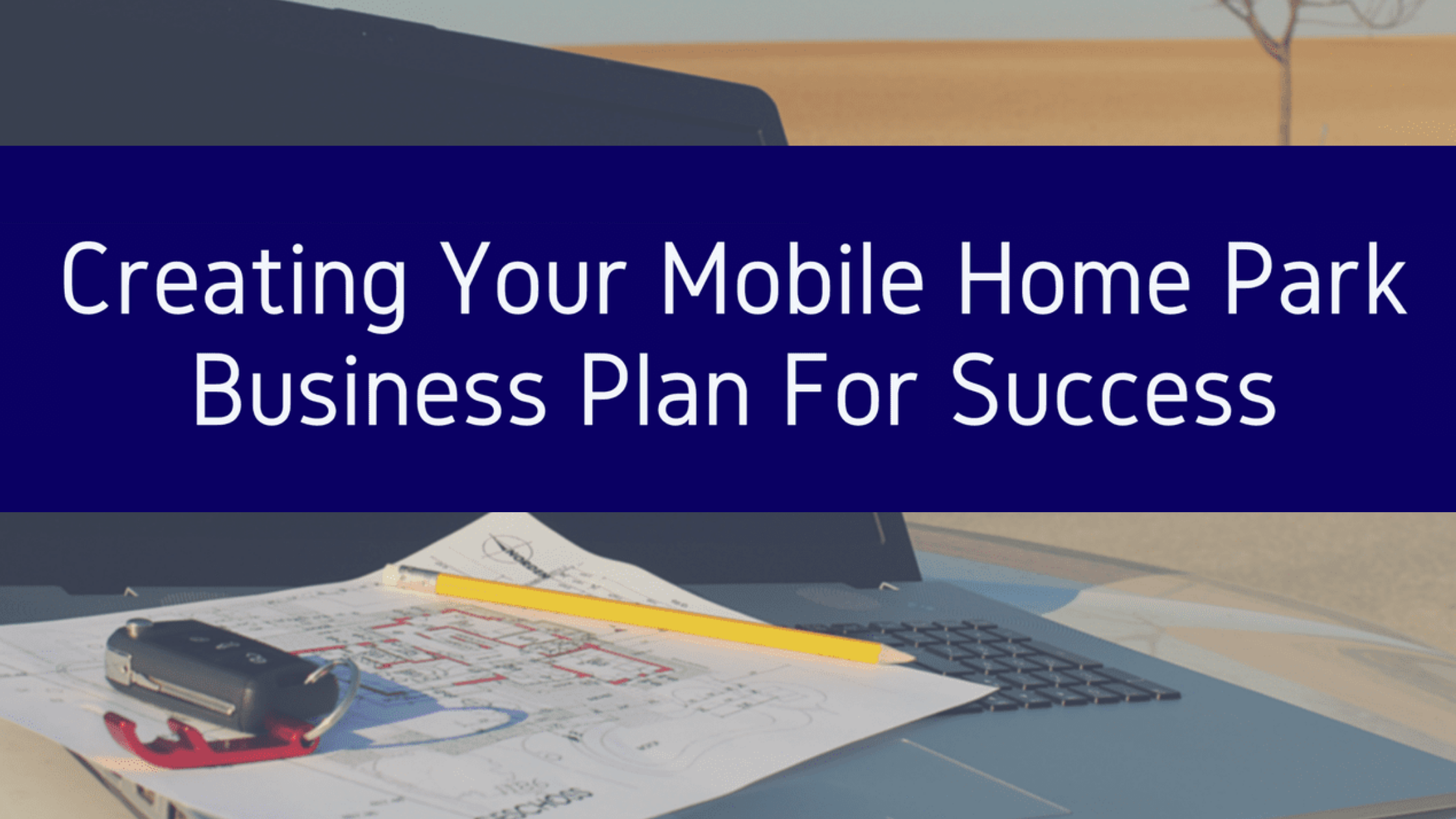To help you create a mobile home park business plan, we are going to go through a basic business plan template and substitute the actual content for advice on what you should write. Remember that everyone will have a unique situation and a set of circumstances that makes it impossible to create a business plan that suits everyone.

Creating a business plan is a fine art. It’s often intimidating and confusing at first because it feels as if many of the standard sections repeat much of the same information. To an extent, this does happen in a business plan. The key is to find each section’s focus or main purpose and change your language and content to contribute to it.
1 Executive summary
Don’t be intimidated by the word “executive.” This first part is basically just a summary of the rest of the document. It usually consists of 3 to 4 paragraphs that mention the following:
- The name of the company/park as well as a brief bio. Mention any background in real estate/property income/mobile homes.
- List the owner(s)/managers of the company.
- Mention the area where the park will operate and the market you will be serving.
- A quick sentence or two about the goal or main idea of the park as well as how you will choose tenants or what kind of tenants for which you are looking.
- The sources of your funds to start the mobile home park.
- If there are occupants already living in the park, list the rate.
1.1 Business objectives
Go into more detail over what you hope to achieve with the park. You can list goals that have to do with profit, growth, filling empty lots, plans for expansion, etc. It’s usually just a bulleted list of goals without any blocks of text.
- What type of growth are you looking for? Do you want to go slow and steady or are you going to push hard from the very beginning?
- How soon do you want to reach peak profitability?
- At what occupancy rate do you want to run?
- Are you aiming to keep crime below a certain level and what are those levels?
- Do you want to make enough money to do something specific, supplement your income, or let it become your primary source of income?
- If there are empty lots, what is the time frame you would like to set to fill up a certain number of those lots?
The list can potentially continue with more objectives that you may have. It’s highly dependant on your prospective park and your ambitions.
1.2 Mission statement
It might seem like you are repeating aspects of the executive summary and the business objectives. However, the mission statement of a mobile home park business plan is one last concise expression of what your vision or ambitions are for the park. Usually, one or two short paragraphs would suffice.
Additionally, you can use a little marketing lingo here and point to problems you see in current mobile home parks that you wish to fix or better yet, avoid, in your mobile home park. In other words, you could say how you want to “create the perfect family community where people can live out the American dream” and that you want to “maintain profitability by enacting due diligence when screening tenants’ financial history.”
1.3 Keys to success
In this section, you can mention the steps you will take or your approach towards creating the park that you believe will lead to success. It’s usually just a few bullet points that start with a few catchy words and then a short explanation. For instance:
- Personal Park Management – Talk about how you will personally act as the landlord of the park and attend to its affairs yourself by making it your full-time job. Remember, you want to catch the attention of your readers or tenants. If you hire a manager, you can say you will look for an experienced manager or that you will work closely with that person.
Furthermore, you can then name a few more of these “keys to success.” You can also talk about how sticking true to the identity of the park will be a key to success in and of itself.
1.4 Guiding principles
Some business plans include a “guiding principles” section. If you look at examples online, you will see that it sounds a lot like keys to success. However, the difference is that the keys to success are usually more actionable statements of intents where guiding principles are more altruistic and passive. Create a mobile home park business plan that stands out with your ideas.
This is easier to put in terms of an actual organization or company. To clarify, you could say how casual or formal your corporate culture should be or that you want to maintain a high standard of customer service, etc.
For a mobile home park, you could state how demanding you will be of your tenants when it comes to maintaining their yard or lot or how strict your vetting of tenants will be.

2 Company summary of your mobile home park business plan
Start this section by briefly mentioning the owners and the company by name, state what type of company it is, and mention once more in what location it will be operating. Make it a short, sweet, and clear paragraph.
2.1 Legal form
If you are buying the park as a company or organization mention the type here. For example, an S or C-corporation.
2.2 Start-up summary
This section is probably the most direct in the whole mobile home park business plan. The start-up summary is where you thoroughly list all your expenses when taking ownership of the park. Using tables to record all your expenses in an organized and easy-to-read way is a bonus. Additionally, use charts that will help to illustrate useful information such as which expenses make up which percentage of your total costs.
Here are the figures you should list here:
- Start-up costs:
- Buying/building cost
- Legal fees
- Stationary
- Advertising
- Taxes
- Any construction
- Required construction
- The required amount of funding
- Current personal assets and liabilities
2.3 Locations and facilities
Unless you operate a large mobile home park investment company, chances are you won’t have your own dedicated office space outside of a park where you work from. In most cases, your management office will be located in the park(s) itself; a brief description would be all you need.
In this section, merely describe the mobile home park or parks. This counts for both the park(s) you currently own as well as new ones you intend to purchase in the near future. Moreover, mention about the landscape, the number and size of lots, the number of homes, the surroundings, phone or internet connections, etc.
Likewise, you should also mention any recreational facilities that will be in the park such as a swimming pool, common area, bbq area or parks.
3 Services
Begin this chapter of services of your mobile home park business plan with a simple paragraph mentioning your top services or just mentioning your approach to extra services.
3.1 Services
Your primary source of income will obviously be the rental income from leasing out homes or lots. You should also mention here any other services that could potentially generate revenue. Just create a bulleted list that includes anything from providing internet, tv packages, extra charges for pets or pet-related services, gardening services, cleaning services, lease termination charges, any application fees, security, etc.
3.2 Competitive comparison
In this section, you need to create a table where you list your “competitors.” These will be the other mobile home parks that are close-by and that cater to the same crowd of people. You should also add the average rent, the size of the parks and their most essential features. This would be another form of marketing that you can add to make your mobile home park more inviting.
3.3 Fulfillment
This is optional, but you can once again talk about how you plan to carry out your services.
3.4 Future services
In this part of the mobile home park business plan, mention once more what other income-generating moves you may make. For example, buying a new park or adding services that you don’t yet offer from those we listed above.
4 Market analysis
Market analysis may sound boring, but it is one of the bigger and more focused chapters of your mobile home park business plan. Begin with a summary or the main points of the data that you present in the following sections. You should use graphs and charts throughout this chapter as they will help illustrate your findings.
4.1 Market segmentation
Using the significance of the demographics of the community in which you will operate will help create a better presentation of your mobile home park business plan. For instance, is there a university in the area which could potentially mean a lot of students/professors? Perhaps mention about neighboring manufacturing plants or mines with a lot of blue collar employees. Are you in an upscale neighborhood? Sometimes people may not be fully aware whether a nearby town has a young or aging population, in which you can also show through demographics.
The market you target is determined by the price and how you present your park. As a tip, start off this section by listing your 2-4 main market groups and give a brief description of each of them.
You can then include a few charts (a pie chart is best for market segments). Correspondingly, add a table that shows the projected growth or decline of each segment over time. Don’t make any observations just yet- stick to presenting the data.
4.2 Target market strategy
Talk about or generally discuss how you plan to target those market segments. Do you prioritize advertising at their work/school? What are some of the plans you to approach these institutions? Is social media a good way to target both the older and younger generation? Are you pricing units so that they are affordable for certain groups?

4.3 Market trends
In this part of the mobile home park business plan, you can make observations on how the growth or the needs of different market segments will affect your business. Briefly talk about how you can adapt to face new challenges and what you believe some of these might be. For example, a common theme with housing, in general, is that the population and their income is always changing.
4.4 Market growth
Here you should bring up the actual growth in demand for the type of housing that you supply.
4.5 Market needs
Use the market segments you identified in the first section and talk about their actual needs and wants. You can then say how you intend to cater specifically for them.
5 Strategy and implementation summary
In this part of your mobile home park business plan, you will need to tie everything up in your final “plan of attack”. Perhaps begin with a brief reminder or summary, reinforcing your target market’s needs when it comes to a mobile home park.
5.1 Competitive edge
Make this your key point of differentiation with your competitors and what you believe will set you apart and make you successful.
5.2 Marketing strategy
Talk about how you intend to present and market yourself to your key market segments. Mention once more the characteristics of your park the market will find appealing. You should have:
- Distribution strategy – how you will satisfy market demands.
- Marketing programs – flyers, word of mouth, social media, etc.
- Positioning statement – this should be a statement that directly speaks to your target market and tells them what you offer.
- Pricing strategy – are you using eye-catching bargain prices or going for exclusivity?
5.3 Sales strategy
You can say how you plan to “close deals” by staying in touch with tenants needs and showing them the quality of life they can expect.
Combine the market segments and growth with your estimation of how quickly you will be able to fill lots and units. Illustrate how your profits will grow and when you expect to see dips and rises. Use charts, graphs, and tables. If you have different types of lots or home units, you can break them up accordingly.
5.4 SWOT analysis
It will be convenient for your personal use and to foster investor confidence to do an honest SWOT analysis. A SWOT analysis is a breakdown of your “Strengths, Weaknesses, Opportunities, and Threats”.
5.5 Strategic alliances
List any mutually beneficial or agreements you might have. As an example, an agreement you have with a supplier of manufactured homes, an outsourcing gardening services, etc.
5.6 Milestones
This is a breakdown of milestones you have already reached and the goals you have set on for the future. Mentioning these in your mobile home business plan would be a great catch. Here are some of the breakthroughs you could mention:
- Incorporation (if you established a company)
- Your first acquisition
- Your registration as a mobile home park operator
- A goal occupancy rate
- A certain amount of profits
- New acquisitions or expansions
You can combine this with a basic budget with estimations of how much each will cost to achieve and as well as a graph/table of how long they will take.
6 Management summary
We won’t spend too much time on this section as it will be very basic for 99% of our readers. If you are an individual who wants to own a mobile home park, there won’t be much to it. However, you should still have the following structure to look professional:
6.1 Organizational structure
In this part of the mobile home park business plan, talk about your chain of management. If you are alone, you’ll only need to talk about yourself. However, if you are buying the park with a partner, mention each partners’ share and where the decision-making power lies. If you plan to divide responsibilities, briefly mention who will be responsible for each task assigned or given.
6.2 Management team
Here you can go into more detail concerning everyone involved role as well as their day to day responsibilities.
6.3 Management team gaps
If you have any positions that need to be filled, be sure to list them here. However, talk about how you plan to fill the gap for the time being. For example, you could talk about hiring an account or a groundskeeper.
6.4 Personal plan
In this section, you should list all your employees or personnel. You might employ your own security, groundskeepers, accountants, gardeners, cleaners, etc. Create a table where you show the number of employees, their salaries, and any yearly increases or bonuses.
Financial plan of your mobile home business plan
The financial plan chapter will go into a very detailed breakdown of your finances that expands on the start-up costs in the beginning and also includes running costs for the future. We recommend that you find someone with experience or a professional to help you with this part of the mobile home park business plan. Here is a great guide on this section by Inc.com.
7.1 Important assumptions
Start off by stating the assumptions that should be made before reading the financial plan. For example, a steady growth trend based on current data, a certain amount of funding, etc.
7.2 Start-up costs
Go through this again in more detail.
7.3 Source and use of funds

Mention any source of funds that will be injected into the park and how it will be used or allocated. Including the investment, you are trying to obtain with the business plan.
7.4 Break-even analysis
When you will break even and how that will occur. You will need to show what rent at what occupancy rate is required to break even at certain running costs. Use a break-even graph as a helpful tip.
7.5 Projections
- Projected profits and losses: List all your income and expenses on a yearly basis and show your expected profits and/or losses for the coming years.
- Pro cash flow: Easy to confuse with profits and losses, be sure to indicate how much money the business is likely to have on hand at any time by accounting for total income and expenses.
- Projected balance sheet: Having a projected balance sheet will help determine what your net-worth will be at different points in the future.
- Business ratios: This shows the above projections in percentages.
Take the time to think, create, and set your mobile home business plan
A business plan can be a very effective tool to get your head around your mobile home park and to measure your progress. As the owner of a mobile home park, we highly suggest you put the time and effort in to come up with a business plan (like these sample ones) for success.
Still in the market for a mobile home park? Be sure to read our How to Start a Mobile Home Park article first.


